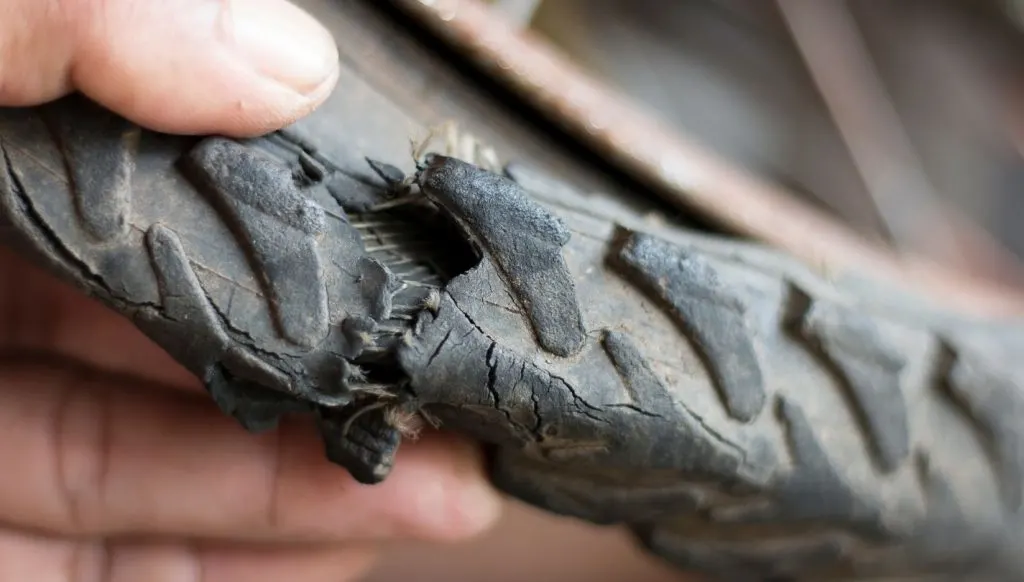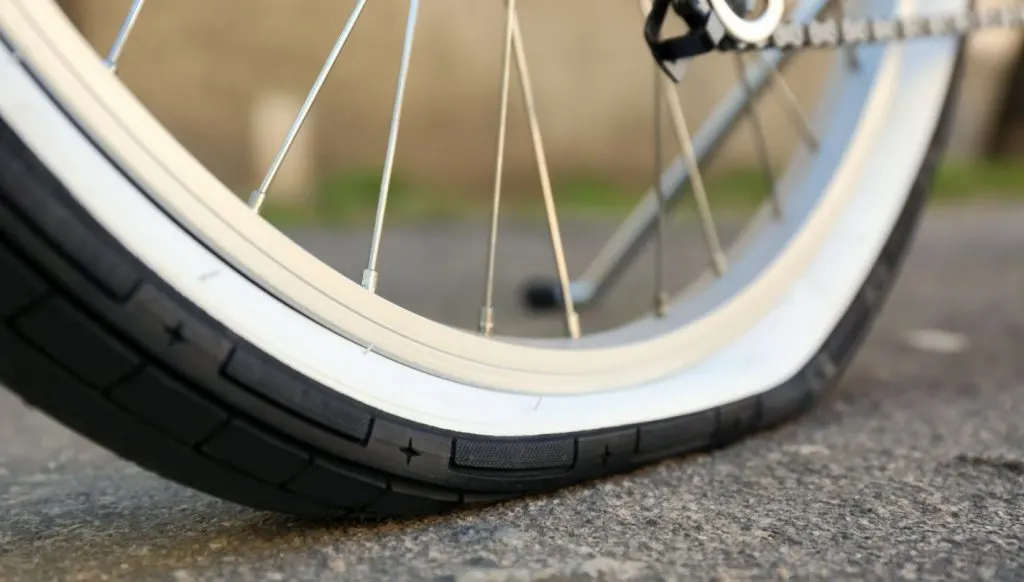
Going out cycling during a heat wave, or cycling in other extreme weather conditions, you might be wondering if you need to be worried about any chance of your tires popping during the ride…
A bicycle tire can certainly “pop” if subjected to temperatures high enough to cause the air in the tire to expand too quickly. The tire will burst due to the accelerated loss of pressurized air from the tire. In effect by breaking rapidly through the tire wall thus causing a small explosion.
Cycling should be a joyous experience, whether you are sightseeing with friends, commuting to work, or sweating it out on the trails. And if your tires do ‘pop’ while biking, there is a chance you could injure yourself quite seriously. Read on to learn how to prevent your tires from popping if you are considering bicycling in the heat.
How Heat Affects Bicycle Tires
Falling off your bike and landing on the ground is a painful experience. Even if your bike is at a dead stop, falling off it from the height of your saddle can really hurt. Now throw in some speed and, well, you get the picture.
Broken bones are definitely attainable, abrasions are a given, and – the most grievous consequence for many cyclists – a broken bicycle, is a distinct possibility. We won’t even mention wounded pride and the galling sound of your riding buddies chuckling at your misfortune!
If you happen to live in an area where the summers are really hot, then excessive temperatures may well be the enemy of your bike tires. If you can remember back to your school science classes you may recall that temperature is directly proportional to pressure.
Put simply, heat causes the already pressurized air inside your tires to start expanding thus creating even more pressure and, in turn, expanding even more.
On top of that ambient temperature induced expansion, is the friction created between the surface of your tire and the hot surface of the road. The heat thus created weakens the rubber of your tire, contributing to the possibility that your tire will give up the struggle, let go, and facilitate a less than graceful trip to the road surface.
How Do I Prevent Heat Affecting My Bike Tire?
It would be trite to say that you should consider moving to an area with a cooler average temperature so we won’t do that, but there are things you can do to prevent the nasty scenario of your tire giving way due to the heat. Here are some tips for prevention:
Inflate your Bike Tires to the Correct Pressure
It may seem counter-intuitive, but under-inflated tires are far more likely to cause a blowout than over-inflated tires.
Under-inflated tires are subject to excessive flexing of the tire wall which will invariably lead to a weakening of the tire wall if done consistently. In addition to that, under-inflated tires will have an increased contact patch with the road surface, leading to more friction and more heat build-up.
Under-inflation causes a much higher rate of heat build-up than merely riding around on hot pavement on a warm day.

Bicycle tire compounds are designed to work within a wide range of temperatures. However, at the extremes (extremely hot or extremely cold tarmac) you would be operating outside of the ideal range. Having said that though, there is almost no possibility of overheating on a properly inflated bicycle tire so it should be of no great concern.
Look After your Bike Tires
These days, many cyclists live in small apartments or with a partner who does not share your love of all things two-wheeled. The temptation is to store your bike outside on the balcony or out on the patio, exposing your bike to the elements. Apart from this being bad for your frame and inviting rust to form over your components, it is also not ideal for your tires.
Tires are made from a rubber compound and they are prone to breaking down over time. This process is accelerated if the tire is subjected to excessive temperatures, whether that is an excess of heat or cold.
Direct sunlight (Ultra Violet Light) and Ozone will also have the effect of breaking down the rubber compound in the tire, making it more likely that the tire will fail.
How can I Best Protect my Bicycle Tires?
Most companies involved in the cycling industry have similar advice about where and how to store your tires. Here’s what some of the larger brands say about the best way to store your tires to protect them:
Hutchinson Tire
“The two biggest things to avoid that degrade tire life are UV and ozone. You can keep tires out of the sun to avoid the UV, but high ozone levels are probably outside your control, especially if you live in a city with high levels of air pollution.
I’d avoid extreme high-low temps as well during storage just to reduce the chance of the rubber drying out and cracking. Oh, and hang the wheels so the tires are not contacting the ground, as the pressure drops creating potential flat spots on the tires.”
Richard Goodwin, Hutchinson Tire North America
Ritchey
“Avoid sunlight, moisture, and flatness. If possible, hang them up for storage. Otherwise, it’s smart to keep them inflated (you’ll have to periodically check them) as once they go flat, the tire can develop cracks from being deformed too long.”
Sean Coffey, Ritchey Global Marketing Director
Specialized
“Tires and tubes should be stored in a dark, cool, ventilated area. Heat, UV light, Ozone, and time degrade the rubber compound. The tires keep their performance level for about three years. Then the aging agents and softeners have dissipated enough to let you feel the difference in grip and suppleness.
However, it is safe to use tires up to six years after manufacturing.”
Wolf Vormwalde, Specialized Bicycle Company
Continental Tire
“Definitely a cool and dark place, just like fine wine — on the rims and enough air to keep them round, although they will steadily bleed down depending on how long they are stored.”
Brett Hahn, Continental Bicycle Tires NA
Conclusion
Your tires popping due to extreme heat is not as likely as it sounds. While it is certainly a possibility that your tire can pop while out on a ride, it is definitely not a probability. Especially if you look after your tires by keeping them out of the elements and pumping them up to the recommended pressure.
